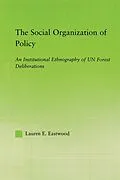This book provides a specific case study--based upon direct research with UN processes--which enables the reader to situate larger theoretical arguments regarding civil society, globalization, and sustainable development within the context of the actual activities of practitioners working within the UN forest policy-making arena.
Autorentext
Dr. Lauren Eastwood is a visiting Assistant Professor in the Department of Sociology at Syracuse University. Her area of expertise is in Sociology of the Environment, with an emphasis on environmental justice, international environmental policy, and civil society engagement in policy-making processes.
Zusammenfassung
This revised textbook is designed for undergraduate courses in cognitive psychology. It approaches cognitive psychology by asking what it says about how people carry out everyday activities: how people organize and use their knowledge in order to behave appropriately in the world in which they live.; Each chapter of the book starts with an example and then uses this to introduce some aspect of the overall cognitive system. Through such examples of cognition in action, important components of the cognitive system are identified, and their interrelationships highlighted. Thus the text demonstrates that each part of the cognitive system can only be understood properly in its place in the functioning of the whole.; This edition features increased coverage of neuropsychological and connectionist approaches to cognition.
Inhalt
Chapter 1 Civil Society, NGOs and Transnational Corporations: Setting the Stage for International Environmental Policy Negotiations; Chapter 2 The UN: Organizational Structure and Forest Negotiations; Chapter 3 Theoretical and Methodological Framework/Data Collection; Chapter 4 Reform Discourses vs. Local Actualities; Chapter 5 Trade and Environment; Chapter 6 The Activation of the Text: Conceptual Resources at Work; Chapter 7 NGOs and the Struggle for Inclusion;
